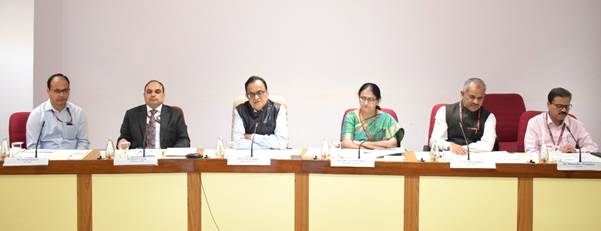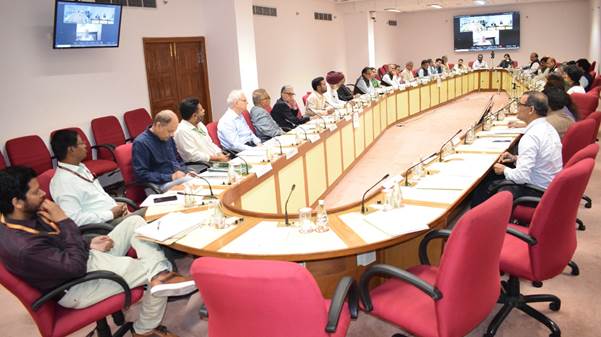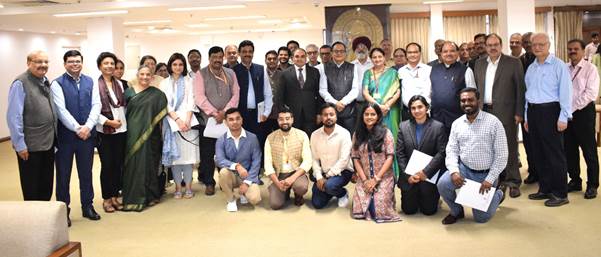Office of Principal Scientific Advisor to GoI
Office of the Principal Scientific Adviser to the Government of India convenes a stakeholders’ meeting on air quality and climate change
प्रविष्टि तिथि:
07 NOV 2024 6:39PM by PIB Delhi
The Principal Scientific Adviser (PSA) to the Government of India, Prof. Ajay Kumar Sood, chaired a stakeholders’ meeting today (November 7, 2024) to address the issue of air pollution and its interplay with climate change.

(Stakeholders’ meeting on air quality and climate change being chaired by Prof. Ajay Kumar Sood, Principal Scientific Adviser to the Government of India)
The meeting was joined by senior government officials including Dr. Parvinder Maini, Scientific Secretary, Office of PSA; Dr. M. Ravichandran, Secretary, Ministry of Earth Sciences; Mr. Rajesh Verma, Chairperson, Commission for Air Quality Management (CAQM); and Dr. Mrutyunjay Mohapatra, Director General, India Meteorological Department. Representatives from Ministry of Environment, Forests and Climate Change, Ministry of Health & Family Welfare, Department of Agriculture and Farmer’ Welfare, NITI Aayog, Central Pollution Control Board, Delhi Pollution Control Board, Punjab Pollution Control Board, Indian Council of Medical Research, National Environmental Engineering Research Institute under Council of Scientific and Industrial Research, National Institute of Advanced Studies (Dr. Shailesh Nayak and Prof. Gufran Beig), Indian Institute of Technology Bombay and Indian Institute of Technology Madras also participated in the meeting.
The Office of the PSA had collaborated with National Institute of Advanced Studies (NIAS) Bengaluru in hosting a Brainstorming Workshop on the National Air Quality Resource Framework of India (NARFI) in June 2022 which had unequivocally underscored the need for such a framework.
In line with this, the Office of the PSA sponsored a project to NIAS in early 2023 to investigate Airshed Management across Peninsular India. This project aims to employ finely gridded emission data and advanced GIS-based models to study atmospheric pollution transport mechanisms, emissions impact assessments, and the specific climatic factors at play in this region. Through this project, NIAS was tasked to help lay the groundwork for an evidence-backed, science-based structure to manage air quality.
In his opening address, Prof. Sood highlighted the critical importance of improving air quality in the context of rapidly changing climatic conditions, underlining its significant implications for public health and environmental sustainability. He stressed that air pollution is a multifaceted issue influenced by a multitude of factors. Prof. Sood highlighted the need to adopt an approach that reflects this complexity, incorporating comprehensive meteorological processes, refined emissions inventories, and detailed airshed mapping to form a robust, strategic response. He also emphasized that the meeting aimed to brainstorm over the findings of the study conducted by NIAS and to discuss ways to incorporate science-based strategies for effective pollution control across short- and long-term timeframes.

(Meeting to deliberate on National Air Quality Resource Framework of India (NARFI) underway)
Dr. Shailesh Nayak, Director, NIAS, set the context of the discussions emphasizing the timely relevance of the findings of the project by NIAS in addressing the air quality challenges faced by India. He explained that NIAS, through the project, is working towards integrating advanced science and cutting-edge technology into a comprehensive platform that can be accessed by both policymakers and the public. Prof. Gufran Beig, Principal Investigator at NIAS, presented in detail the findings of the project through the concept of NARFI and its components, as a resource framework to address both air pollution and Short-lived Climate Forcers.

(Group photo for the stakeholders’ meeting)
The meeting reinforced the imperative to develop a comprehensive resource framework that provides a multi-sectoral, science-based, integrated solution, spanning fundamental and applied science, management, and policy interventions. This approach can deliver co-benefits for both climate change mitigation and public health. Prof. Sood requested all the participants to send their feedback on the study.
*****
MJPS/ST
(रिलीज़ आईडी: 2071578)
आगंतुक पटल : 1447